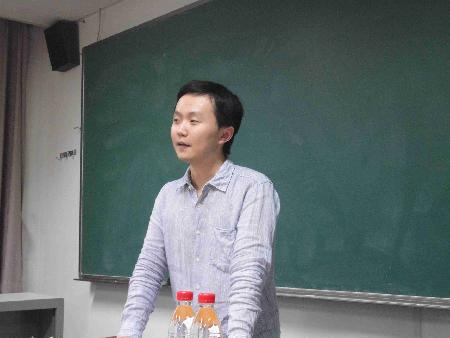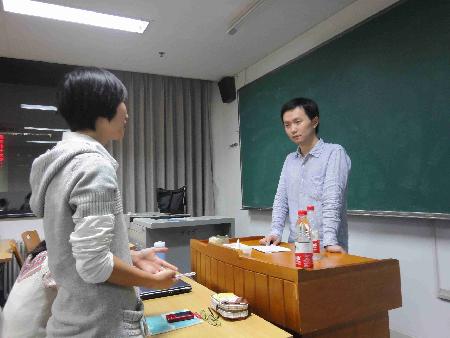Peking University, Sept. 30, 2011: "Journalism is another name of democracy. It plays an indispensable role in creating a democratic world." said Fang Kecheng '08, MA '10 at the Lecture Series of Peking University News on September 28, 2011.
It was a lecture for any student who harbors an aspiration towards journalism. Fang, the main speaker, is with Southern Weekly, an independent, wide-spread and the most popular weekly in China. "I feel so encouraged seeing so many PKU students interested in journalism, because as we all know, journalism is not a domain where you can make big money," Fang expressed at the beginning of the lecture.
Inaugurated in October 2010, the Lecture Series of Peking University News aims at in-depth dialogue between college students and people from mediasphere.

Fang talked about the career ethics as a journalist
Based on the questions students submitted or raised at the lecture, Fang talked freely about the industry and the life as a journalist, especially about being a journalist in China.
"Some people say journalism isn’t a special career and it’s as common as being a carpenter." Fang was opposed to this notion, "Some journalists tend to consider this career heroic but wretched, yet it’s important for them to lower their career evaluation. But one thing undoubtedly differentiates journalists from carpenters — social responsibility. Journalism is another name of democracy; it is an irreplaceable tool of supervision... Journalists cherish dreams and they have social responsibilities to shoulder."
One of the responsibilities Fang mentioned at the lecture is to enlighten more Chinese people. He used one of the Southern Weekly’ s columns, "Commonsense," as an example. "Through this column, readers can get a better understanding about human rights, the country’s operations, current social problems and other knowledge related to our country." Thank to his personal connection with some government officials, he himself has written a report in this column about an imaginary Chinese official surviving under current official regulations, which would obviously be boring if just listed clause after clause. Fang admitted that this kind of report was not in a traditional news format, but could effectively provide readers some secret knowledge.

A freshman from the PKU School of Economics raised a question.
Bearing in mind the importance of balancing social ideals and reality, Fang said "never tell lies" is the basic principle. As for some sensitive news, a journalist can do adequate preparation in advance and wait for a more suitable time to report, or he can report it from a different perspective, "Imagination is really important for a journalist."
What is also important to a journalist is experience. Fang told a story about one of his colleagues being detained in a lockup because of violating traffic rules, "This gave him an opportunity to get to know the real condition in a lockup. He had first hand information about the rules and the situations of other detainees. For a journalist, every piece of experience is a treasure."
Witnessing those young but ambitious reporters struggling to be exceptional journalists, Fang encouraged these students before the lecture ended, "The university is a good environment for talking and getting to know about the society, so just make full use of it!"
Reported by: Liu Yineng
Edited by: Arthars